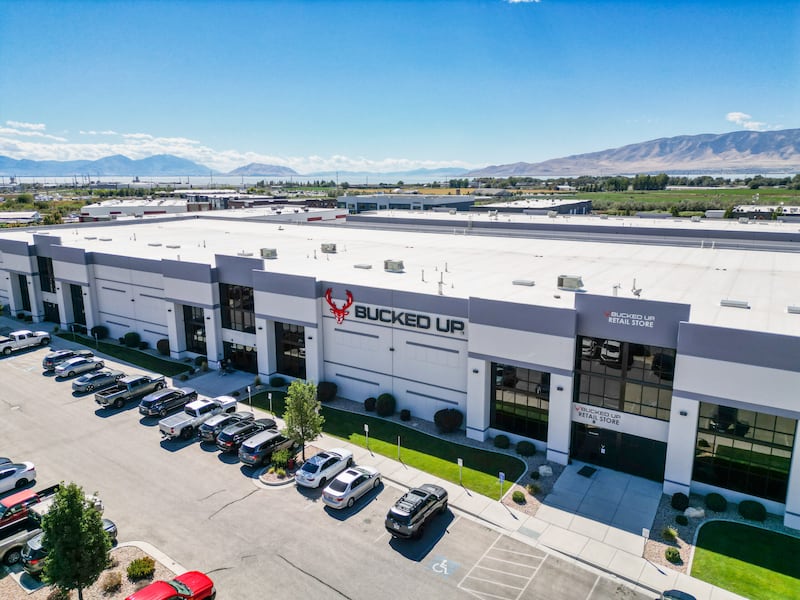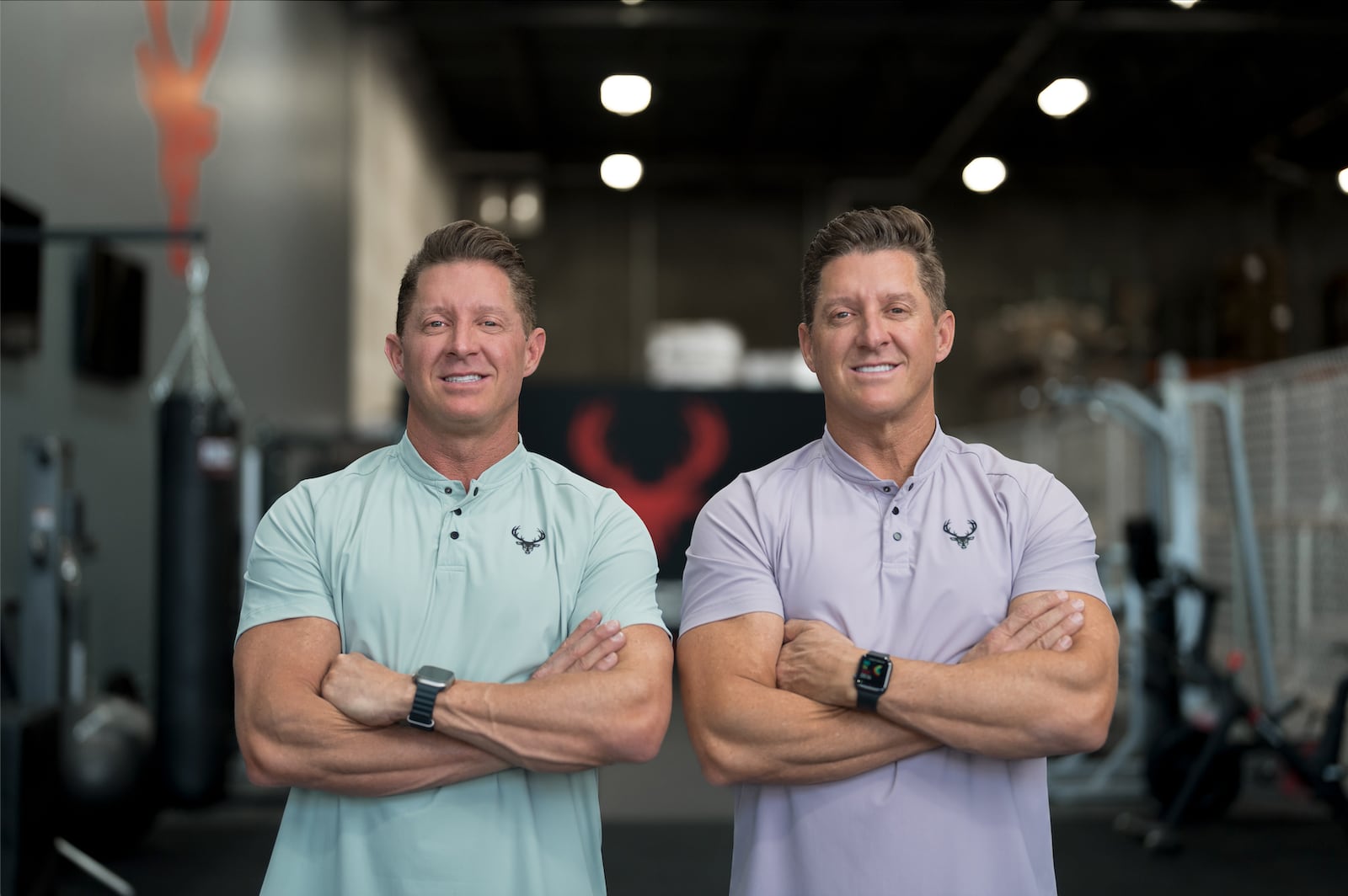At one time, my twin brother Jeff and I seemed destined to work forever on the farm we grew up on in Clearfield, Utah. Our dad would have probably liked that, too, but we had higher aspirations. As the sons of parents who each started and ran their own businesses, we wanted a say in how our dreams got built.
Instead of tending to animals our entire working lives, we created a different path altogether when we founded Bucked Up. Since its beginning in 2016, customers and sales have continuously increased — and exponentially so. Here’s how we made it from there to where we are today.
Farm fresh hustle
Growing up, we had horses and cows. We had 55 chickens laying 50 eggs a day that my brother and I sold door-to-door. Our three acres were filled with corn, beans and tomatoes, which we also picked and sold. My family was literally living off the ground we lived on, and our meals consisted of everything we grew and raised. We were up and ready to work at 6 a.m., as soon as the sun came up, and my dad made sure of that.
But after we both finished two-year missions for our church, my brother and I decided farm life wasn’t for us. We enrolled as students at Utah Valley University and started down our respective career paths. When I started working in sales to pay my bills, I noticed the guy earning the most was providing the sales floor with leads. I wanted to do what he was doing. Point blank, I asked him, “Do you have a job for me?” He did. For the next two years, I was hired on to learn how to produce leads. Once I became good at it, I produced leads for others, driving web traffic to their site(s) of choice. As business continued to increase, I decided to branch out on my own. Jeff and I started an affiliate network to drive traffic to people’s websites.
People from all over the state started hitting me up to help increase visits to their sites. We did that a long time before finally applying our skills to growing audiences for our own products.
We had our first chance when a gentleman came to us with L-arginine Plus, a vasodilator designed to help older adults on high blood pressure medication wean themselves off of it. He walked in attempting to sell us this product, and an hour and a half later, we owned 50 percent of his company.
Our advice to him was simple enough: Make sure there was always plenty of product in stock. That’s all we were concerned about. If he could continually manufacture his products, we knew we could provide a steady stream of customers.
When he first came to us, he admitted he was making $600 a day. A month after we met, sales shot up to $3,600 a day. I noticed l-arginine.com was ranking high in online search results even though nothing was being sold, so we tried buying it. The owner was based in the United Kingdom and was happy to sell — for $25,000.
Spending that much was a big gamble, but we were willing to take the risk. Besides, Google was starting to reward people for having exact-match domains. If we owned l-arginine.com and a search was made, we’d be among the first addresses to pop up.
A few months later, all searches for l-arginine started going to the first couple of search results on the page. We were ranked number one, so it worked out in our favor. At its height, we were doing nearly $4 million a year for a single-product website.
Just like that, we’d found our new direction: supplements.

The rise of Bucked Up
My brother and I read an article that said deer antler spray was banned in Major League Baseball. It helped people recover after workouts, but because it seemed to give athletes a competitive edge, the spray was banned in professional sports.
It seemed like we were onto another l-arginine product. Right away, I went to GoDaddy and bought the domain name for eight bucks. Next, I found a manufacturer in Florida that could produce deer antler spray, and we promptly ordered 3,500 bottles.
Product familiarity was an issue, though. When we started selling it, only a few people even knew what deer antler spray was. Early sales reflected that. We sold no more than 10-15 bottles a day, and they all had expiration dates. We started hoping they’d all sell in time.
Eight months later, former Baltimore Ravens linebacker Ray Lewis was accused of taking deer antler spray right before the Super Bowl. It was just the advertising we needed. Overnight, our website exploded. Everybody was searching online for deer antler spray. They found our site, and we sold all remaining bottles in under 24 hours.
The next day, GNC called us to see how fast we could get them 30,000 bottles. When I called our manufacturer, he said, “I thought I’d be hearing from you.” Within 30 days, we got 50,000 bottles over to GNC, and within weeks, we were selling 2,000+ bottles a week.
That led to attending fitness expos all over the country, where I noticed a lot of the vendors marketing pre-workout supplements, a mix of proprietary vitamins and minerals taken before working out that can help increase energy or endurance. It was new territory for us. My brother and I had never even tried a pre-workout supplement before.
For the uninitiated, pre-workouts are not all created alike. Some taste terrible, and some don’t reveal what’s inside. But athletes wanted them — that much was clear. We started selling our own pre-workout. When we launched it at the Los Angeles Fitness Expo with 1,000 bottles, we sold out.
Because we added deer antler velvet extract to our pre-workout, it gave us an edge over other pre-workouts. It tasted better than anything else on the market. And because it was a non-proprietary blend, you could see what was included. Only clinically proven ingredients were used, allowing everybody to get a great workout by taking it prior.
Creating that pre-workout led to its own stream of successes, and we’ve not looked back since. Today, we sell almost a million bottles of Bucked Up pre-workout every month. Our line of energy drinks isn’t far behind. We’re on track to sell $60 million of energy drinks this year.
From 2016 to 2021, we doubled in sales every year. We went from selling $5 million of products one year to $12 million the next year. Then it went from $24 million one year to $80 million the next. Bucked Up is set to do $250+ million dollars in sales this year, our biggest year so far.
When you get into hundreds of millions of dollars, it’s harder to move the needle forward, but so far, so good. Everything is moving in the right direction.
Better late than bitter
At Bucked Up, we can be picky about our products tasting exactly right. Not only do they need the right flavors, they have to be effective. We were set to launch our first energy drink at FitCon in April of 2019 when we hit a roadblock of sorts. Instead of launching, we destroyed more than 250,000 cans. They didn’t taste how they were supposed to. Unbeknownst to us, the masking agent we used to cover up the more bitter ingredients fell off after six days, and the result was less than palatable.
We released many cans before knowing they wouldn’t taste how we wanted them to. It took someone posting online about it at FitCon and saying it was the first time our product hadn’t tasted as good as they expected it to get me to put the brakes on. Immediately, I called back all the cans we had made and had them destroyed.
That was a pivotal moment for us. We didn’t launch energy drinks until a year later because we wanted to figure out our issues and not repeat that same mistake. It felt like we only had one shot at doing it right. In a way, though, our misstep worked out in our favor. Looking back, if we had launched any earlier and released a bad product, we could have faced serious financial consequences. It’d have been a whole different situation.
What’s in a name
In the beginning, we sold deer antler spray. When we added a pre-workout supplement, we needed a new name, so we stuck with the deer theme.
One of the unique parts of our company is that we have an ambassador program in place. Over 80,000 ambassadors in our network promote Bucked Up, and that’s key to our success. What we say about our company is much less important than what everybody else says about it.
When we were bouncing around ideas of what to call the new product (and eventually ourselves), one ambassador suggested we call it Bucked Up, and we liked it right away. The domain was available, and I didn’t question buying it immediately. I didn’t even negotiate a better price because I knew the value of a good domain.
My parents hated the name. As boys, my dad never let us say any F words, even freak, flip, or fetch. When we announced we were calling our company Bucked Up, they were totally against it. For years, they said their boys ran “a supplement company” in Utah County. As we’ve become more successful, they’ve come around. They say, “Oh, my boys own Bucked Up,” and it rolls right off their tongue.
Utah strong
Growing up on the farm taught us a lot, and my parents made us work hard. That’s been part of our success. We’d visit other supplement companies that started at the same time we did, and hardly anybody would be in their offices. It was easy to figure out why we were doing better.
Those are the same attributes we look for in our employees. Hiring the right people from the very beginning is so important. You want someone who works hard, is smart, efficient and trustworthy. If you have those values in an employee, you can train them to be whatever you want them to be. If I had to do it over again, I would hire the right people in the very beginning and build the team right away instead of being so stingy.
Utahns are frugal people. We want it as cheap as we can get it. Sometimes, though, that’s not the best way to go. We’ve lost talented people because we weren’t paying them enough. At the time, we didn’t know any better. My advice now is to spend the money and hire the right people right away. Your business will directly benefit.
People are starting to recognize Bucked Up as another big brand born in Utah. Companies need to start somewhere, and this is the best place to do so. We love our customers, and in turn, they love being affiliated with our brand. The support is unreal in Utah, where people are known for showing so much support to local brands. Crumbl and Vivint are both big-time companies that started here and plenty of others are on the rise. It’s because Utahns support each other.

